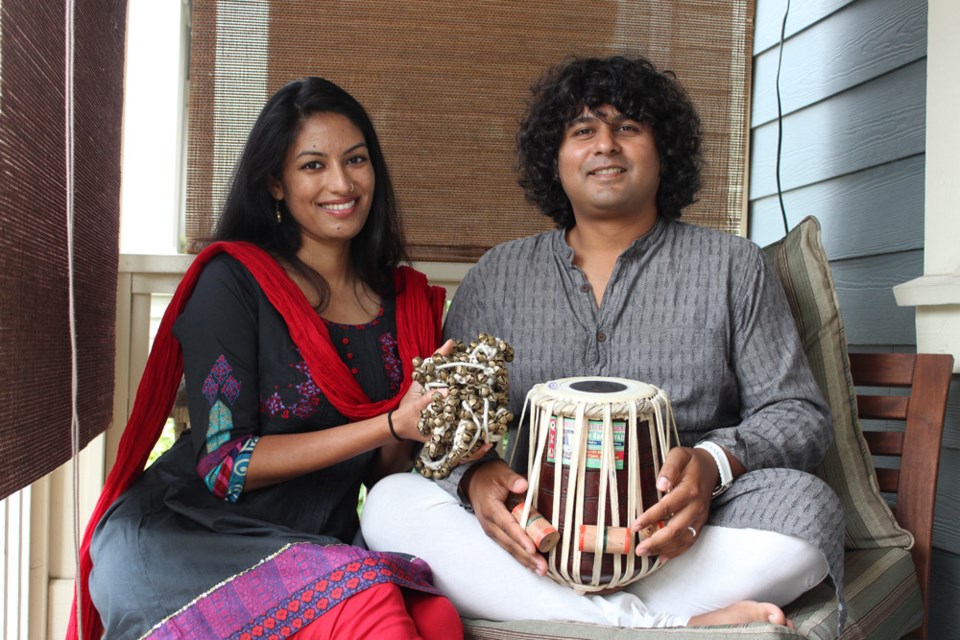For Cassius Khan and Amika Kushwaha, classical Indian music is about far more than simply song and dance.
It's about spirituality, forging a deeper connection with the universe, a quest for the divine.
The husband-and-wife duo are bringing their passion for their art forms to the stage at the Massey Theatre on Sept. 28, for the second annual Mushtari Begum Festival of Indian Classical Music and Dance.
The festival's very name sets the tone for Khan. Begum was his vocal teacher, and it's in her honour that he's striving to bring together only the very best performers.
"It is a tribute to her memory and to her musicality," Khan says, in an interview at his Queensborough home. "It's a tribute from a student to his guru."
The festival brings together four top-calibre Canadian-Indian artists, with two vocalists and two dancers. The two vocalists are Khan, who's also a tabla player, and Dr. Kamaljeet Gill. Kushwaha and Naren Ganesan are the dancers.
Each artist is a world-class performer in a different classical Indian art form.
Khan is unique in being a musician who simultaneously sings and plays tabla - something that's unheard of due to the complexities and demands of both art forms.
He specializes in the singing of ghazals, poetry written in the Urdu language, as well as lighter classical compositions known as thumri.
Gill is a specialist in khayal - a word that means "thought."
Kushwaha explains that in khayal, the words are very simple, but the singer must explore how to portray their own thoughts and interpretation of the lyrics through the voice.
"It's, 'How many different ways can I express it?'" she explains.
Ganesan is a top expert in the South Indian dance form of Bharathanatyam, performing to the music of Prana: Abhishek Iyer on tabla, Dr. Deepak Paramashivan on vocals and Mukun Shankar Krishnan on violin.
Kushwaha herself is a kathak dancer, who has been training in the North Indian dance form since childhood and now works as both a performer and teacher.
Kathak began life as a storytelling dance from the temples and evolved over the years, with India's changing history, into a more abstract performance form featuring complicated footwork, rhythms and spins.
Kushwaha performs to live music performed by Khan.
The emphasis on live music with dance is an important part of the festival, as Kushwaha notes it brings an entirely new level to the performance.
"The moments of energy, that spontaneity, the connection you have with the music, you can't capture that anywhere else," Kushwaha says. "That's how every performance becomes different."
Khan and Kushwaha are hoping that the festival will attract a broad audience - not just those of Indian background, but people of all cultures, ages and backgrounds.
They admit that the audience for Indian classical music is a small one, but they're hoping to change that by displaying its universality.
Khan notes that classical music reflects the universe around us: the seasons, the water, the cosmos itself.
"It's a lot of rigorous training; we have to show these elements," Khan says. "In my tabla playing I show monsoon rains, I show the lion and the gazelle."
On an even deeper level, he notes, it's said that practising and listening to classical Indian music brings one closer to the divine.
"Classical music brings you closer to the divine, supernatural power of the universe," he says.
He notes that classical Indian music is based on some 63,000 ragas - various intonations and patterns based on combinations of notes - and each raga has specific effects on the human body and on the energy of the world around it.
"One can actually feel it," he says.
With so many ragas, he says, a performer would need many lifetimes to master them all. Most top performers work with eight or 10 in a lifetime.
"In India, they have perfected a lot of things as far as mind, body and soul in music," Khan says. "That's why it resonates so well with everyone. It brings peace to your mind."
Kushwaha is quick to dispel the notion that listening to classical music is "boring," or that it requires sitting quietly without making a sound.
"It's exactly the opposite of that," she says. "We like to hear people cheering and clapping. ... The bottom line is, the audience will not be bored. Even though they do not understand the language, there is always something we can connect with."
Tickets are on sale at the Massey Theatre box office, 604-521-5050 or through www.masseytheatre.com.
For more, see www.mushtaribegumfestival.webs.com.



